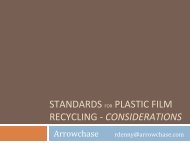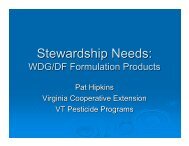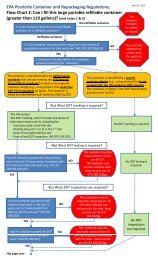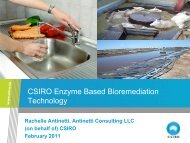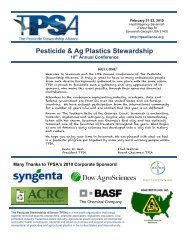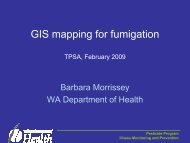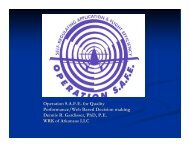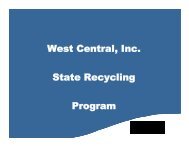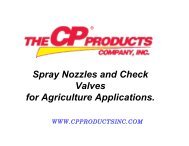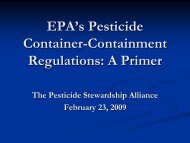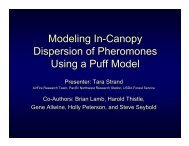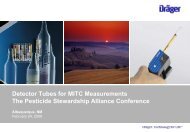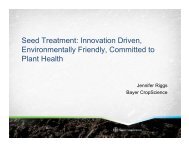Clean Sweep Programs - US Environmental Protection Agency
Clean Sweep Programs - US Environmental Protection Agency
Clean Sweep Programs - US Environmental Protection Agency
- No tags were found...
You also want an ePaper? Increase the reach of your titles
YUMPU automatically turns print PDFs into web optimized ePapers that Google loves.
Section 2 <strong>Clean</strong> <strong>Sweep</strong> Program Operationsparticipants pay half the disposal cost for agriculturalpesticides and the full disposal costs for otherwastes. Even with paying the full disposal costs,they generally save 20 percent to 30 percent of thecost of having a waste hauler pick up wastechemicals at their location.2.5 What materials are collected in<strong>Clean</strong> <strong>Sweep</strong> programs?<strong>Clean</strong> <strong>Sweep</strong> programs are intended tocollect unwanted pesticides, and 34 of the stateswith <strong>Clean</strong> <strong>Sweep</strong> programs collect only pesticides.All of these states collect agricultural pesticides,while Colorado, Idaho, Michigan, Montana andNorth Carolina also collect pesticides fromhouseholds. Eight other states collect pesticides andall kinds of household hazardous waste as part oftheir <strong>Clean</strong> <strong>Sweep</strong> programs. Four states collectitems other than pesticides and household hazardouswaste. Texas collects empty pesticide containers,batteries, used oil and oil filters, and, at several pastevents, metal and wire. Wisconsin collectsunwanted chemicals from non-pesticide businesses.In 1997, Oregon began to collect waste pesticidesas universal waste in conjunction with its householdhazardous waste collections. Oregon also includedwastes from businesses that generate small quantitiesof hazardous waste, called conditionally exemptsmall quantity generators (CESQGs). In Oregon’sprogram, one contractor collects the different wastestreams at one location, thereby reducing thecollection cost, but keeps the waste streamsseparate. Mississippi has collected tires, waste oiland batteries in the past.the sumps and create disposal problems. Agriculturalcooperatives and farm chemical dealersrequested assistance in getting rid of these materialsin an environmentally sound manner. The stateagreed to accept this waste with the condition thatparticipants pay one-half of the disposal costs.Companies are asked to remove as much water aspossible from the sludge before bringing it to the<strong>Clean</strong> <strong>Sweep</strong> event.Information on the materials collected byeach state in its <strong>Clean</strong> <strong>Sweep</strong> program is provided inTable 4 and Figure 5.Most states also conduct, or have conducted,empty pesticide container collection andrecycling programs, often with the assistance andcollaboration of the Ag Container Recycling Council(ACRC), a non-profit organization. The ACRC iscomposed largely of pesticide manufacturers, whoeach contribute to the Council an amount of moneyproportional to the quantity of plastic containers thecompany uses to distribute its pesticides. TheACRC assists pesticide container collectionprograms by providing training, funding, guidanceFIGURE 5 State <strong>Clean</strong> <strong>Sweep</strong> Materials Collected34 Pest. only4 Pest. & other matIn 2001, Wisconsin began accepting sludgefrom mixing and loading pad sumps and weigh-scalepits. As fertilizer trucks and pesticide applicationequipment are filled or cleaned, dirt, debris,fertilizers, pesticides and other chemicals collect in8 Pest. & HHWPesticides only:Pesticides and household hazardous waste:Pesticides and other material:34 states8 states4 states18



